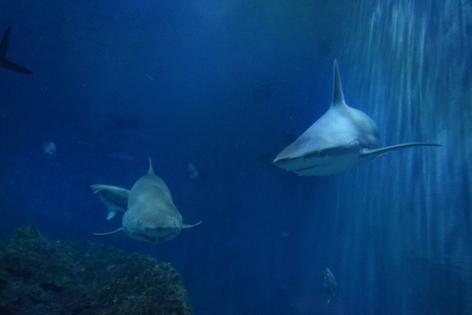Sharks might be spending less time in Florida. That's actually not good
Published in Science & Technology News
MIAMI — Fishermen sometimes complain that they munch their catch before they can get it into their boat, and every so often, one might bite a swimmer or surfer. But as far as the health of our oceans go, sharks are vital – and seeing fewer of them, as new research projects, might have “catastrophic” consequences.
“We’ve noticed that with ocean warming, sharks are leaving these regions later on in the year because they’re very temperature driven,” said Maria Manz, the lead author of a new study that tracked the migratory behavior of six shark species within the Mid-Atlantic Bight, a coastal region stretching from Massachusetts to North Carolina.
Manz, a doctoral candidate at Stony Brook University in New York, and colleagues from seven other U.S. institutions used National Oceanic and Atmospheric Administration data to create a model to project how their observations would play out on a grander scale. If the ocean surface temperature warms by 2.01 degrees Celsius, for example, species like the sandbar shark would arrive in Florida almost a month later than they used to.
Under current projections, that could become reality within the next five to 25 years if fossil fuel usage is unabated, the path we’re on under current US policies.
If that happens, sharks also might not stay as long or not swim as far south as Florida at all. Local coastal waters would turn too hot for them, while the beaches of the Carolinas, for example, might feel just right.
Already, Florida Atlantic University documented that Florida’s blacktip shark numbers decreased by almost 60 percent between 2011 and 2019, from a peak of 12,128 individuals to 4,955.
What could a shift in shark migration of population mean for the marine ecosystem?
Mahmood Shivji, director of Nova Southeastern University’s Guy Harvey Research Institute and a leader in shark research, cautioned that he was unaware of studies that detailed the exact effect a decline of sharks would have. But he had no doubt that a limited presence of these major predators would have wide-ranging, potentially catastrophic ramifications on the entire foodweb.
Sandbar, dusky and blacktip sharks, for example, are among larger shark species whose preferred prey include groupers and snappers, whose numbers might increase. While that might initially sound like good news to fishermen “it’s not just about enabling you to catch more fish so you can take it home,” Shivji said.
An excess of larger, predatory fish would decrease the numbers of the smaller fish, crustaceans, and mollusks they eat. If there’s few of those smaller fish, others down the food web might thrive — a cascading effect that might be felt all the way to the bottom of the chain.
“The entire normal balance, the way things have been, sort of historically, evolutionarily, all that changes, and what impact that is going to have downstream – of course, nobody really knows,” Shivji said.
At the bottom of the food chain, for example, a decline in species that eat blue-green algae could, theoretically, increase the chances of toxic algae blooms, Shivji said. Major blooms in 2019 already prompted Gov. Ron DeSantis to create a task force, sicken around 80,000 Americans a year, and are linked to a range of diseases, including Alzheimer’s and liver damage. Removing top predators like shark will have a cascading effect, Shivji said. “There’s no doubt about this.”
There’s also no doubt that these changes to migratory behavior of sharks, as well as countless other species across the planet, are happening quickly. Ecosystems don’t have enough time to adapt, he said. “These are definitely big changes and when changes happen quickly, they tend to be catastrophic.”
_____
©2025 Miami Herald. Visit at miamiherald.com. Distributed by Tribune Content Agency, LLC.







Comments